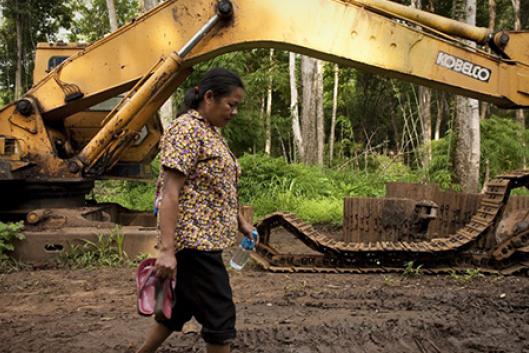A small group of transnational corporations dominate, to an increasingly greater degree, almost every sector of the economy. These corporations were already big, but now they are enormous, and their activities are causing ever more negative impacts. At the same time, thanks to the hard-fought struggles by local communities, movements, organizations and activists, these same corporations have found themselves forced to adopt written commitments to certain ethical standards and to corporate social and environmental responsibility. They have also begun to develop systems for the certification of “sustainability” and to talk about “best practice”. They have even begun to talk about respecting human rights.
In this bulletin, dedicated once again to International Human Rights Day, we have sought to reflect on this matter by looking at the conduct of big corporations. The analysis makes it impossible to ignore how the activities of these companies violate a wide range of basic rights, including those enshrined in international laws and agreements. Among basic rights, for example, we include all those which seek to guarantee the dignity of human beings and social and environmental justice.
This bulletin documents the violence of land grabbing as perhaps one of the most brutal corporate activities today, one which is expressed in various ways. It is violent how big corporations in the eucalyptus and pulp sector grab ever greater areas of land in countries like Brazil, to establish massive industrial plantations, and how they have historically done so illegally and with the support of the government. Also violent is the unbridled expansion of big oil palm plantation corporations in Africa, which are invading the lands of peasant farmers, jeopardising food sovereignty and increasing hunger in countries like Sierra Leone. Equally violent is the way big corporations in the energy sector are grabbing land to build hydroelectric mega-dams in Malaysia and other countries, destroying biodiversity, forests and the livelihoods of the population, in order to profit from electricity generation. All of this results in massive liabilities, with millions of people forced off their lands and pushed to the peripheries of big cities, where an ever greater percentage of the population in the global South is now concentrated, even though there is enough land for a large part of that population to work the land, live in dignity and guarantee the food sovereignty of their countries.
The way that corporations treat their workers today is also violent, both those who are directly employed by them and, even more so, those who are indirectly employed. Slavery, which was formally abolished long ago around the world, continues to exist and worsen in the regions that supply big corporations with raw materials – for example, on the vast industrial oil palm plantations in Malaysia and Indonesia, the main producers of palm oil.
It is violent how big corporations do not accept limits to their activities, which are increasingly more globalized through “free trade”, which signifies a great advantage for even further increasing their profits. And because they control the market, they can gain even greater advantage. Corporations seek to guarantee their interests in key spaces like the World Trade Organization (WTO), which recently met in Bali, Indonesia.
It is violent as well when big companies adopt the discourse of the “sustainability” of tropical timber produced through so-called “sustainable forest management”, which actually promotes the gradual devastation of tropical forests, destroying the future of communities who depend on these forests for their livelihoods and ways of life. The only real objectives of this “sustainable” forest management are increasing corporate profits and promoting the consumption of unnecessary goods.
Without a doubt, it is extremely important to continue to fight to ensure that our governments, and the UN, guarantee basic human rights, placing special emphasis on the tireless struggle of La Via Campesina in recent years to push for the adoption of a UN declaration on the rights of peasant farmers – a struggle that deserves everyone’s support.
At the same time, it is necessary to recognize that big corporations, based on the logic of the capitalist system itself, are interested only in accumulation, speculation and generating ever greater profits. Big corporations are the ultimate expression of an intrinsically unjust and exploitative system. They seek to open up ever more markets, including those related to “sustainability” through “certificates of sustainability”, “social and environmental corporate responsibility” policies and “codes of ethics”. They do not accept binding rules, pushing instead for voluntary systems, since under the logic of capital, markets cannot impose barriers to free trade for corporations, and this applies to the “sustainability” business as well.
Without changes at the global level to drastically restrict the action of big corporations, we will witness the continued occupation and privatization of lands and forests by corporate power, and the myriad violations of rights will not stop. It is therefore well worth focusing efforts on holding corporations accountable for their current and historic rights violations.
We call on everyone to support and join the Global Campaign to Dismantle Corporate Power and End the Impunity of Transnational Corporations. Respect for human rights and corporations do not mix; human rights can only be combined with an economic system based on solidarity, food sovereignty and social and environmental justice.
